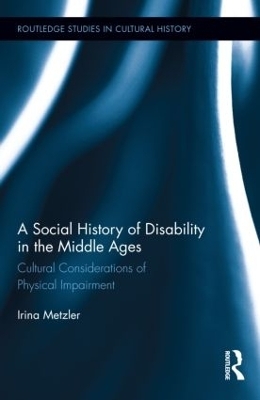
A Social History of Disability in the Middle Ages
Cultural Considerations of Physical Impairment
Seiten
2013
Routledge (Verlag)
978-0-415-82259-6 (ISBN)
Routledge (Verlag)
978-0-415-82259-6 (ISBN)
This book covers the social history of disability in the Middle Ages. By exploring cultural discourses of medieval disability, the volume opens up the subject of disability history prior to the modern period. The wealth, variety and significance of sources inform how law, work, age and charity affected medieval disability.
What was it like to be disabled in the Middle Ages? How did people become disabled? Did welfare support exist? This book discusses social and cultural factors affecting the lives of medieval crippled, deaf, mute and blind people, those nowadays collectively called "disabled." Although the word did not exist then, many of the experiences disabled people might have today can already be traced back to medieval social institutions and cultural attitudes.
This volume informs our knowledge of the topic by investigating the impact medieval laws had on the social position of disabled people, and conversely, how people might become disabled through judicial actions; ideas of work and how work could both cause disability through industrial accidents but also provide continued ability to earn a living through occupational support networks; the disabling effects of old age and associated physical deteriorations; and the changing nature of attitudes towards welfare provision for the disabled and the ambivalent role of medieval institutions and charity in the support and care of disabled people.
What was it like to be disabled in the Middle Ages? How did people become disabled? Did welfare support exist? This book discusses social and cultural factors affecting the lives of medieval crippled, deaf, mute and blind people, those nowadays collectively called "disabled." Although the word did not exist then, many of the experiences disabled people might have today can already be traced back to medieval social institutions and cultural attitudes.
This volume informs our knowledge of the topic by investigating the impact medieval laws had on the social position of disabled people, and conversely, how people might become disabled through judicial actions; ideas of work and how work could both cause disability through industrial accidents but also provide continued ability to earn a living through occupational support networks; the disabling effects of old age and associated physical deteriorations; and the changing nature of attitudes towards welfare provision for the disabled and the ambivalent role of medieval institutions and charity in the support and care of disabled people.
Irina Metzler studied Classical and Medieval History, gaining a doctorate from the University of Reading, honorary research affiliations with the universities of Bristol and Swansea, and was awarded a Wellcome Trust fellowship (2012). She has published widely on cultural, religious and social aspects of disability in the European Middle Ages.
Introduction. 1. Law 2. Work 3. Ageing 4. Charity. Conclusion.
| Erscheint lt. Verlag | 12.4.2013 |
|---|---|
| Reihe/Serie | Routledge Studies in Cultural History |
| Zusatzinfo | 2 Tables, black and white |
| Verlagsort | London |
| Sprache | englisch |
| Maße | 152 x 229 mm |
| Gewicht | 800 g |
| Themenwelt | Geschichte ► Allgemeine Geschichte ► Mittelalter |
| Geschichte ► Teilgebiete der Geschichte ► Kulturgeschichte | |
| Geschichte ► Teilgebiete der Geschichte ► Sozialgeschichte | |
| Sozialwissenschaften ► Soziologie | |
| ISBN-10 | 0-415-82259-9 / 0415822599 |
| ISBN-13 | 978-0-415-82259-6 / 9780415822596 |
| Zustand | Neuware |
| Haben Sie eine Frage zum Produkt? |
Mehr entdecken
aus dem Bereich
aus dem Bereich
eine neue Geschichte des Mittelalters
Buch | Hardcover (2023)
C.H.Beck (Verlag)
CHF 53,20


